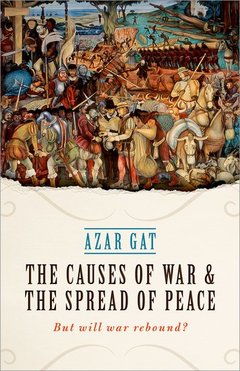Description
The Causes of War and the Spread of Peace
But Will War Rebound?
Author: Gat Azar
Language: English
Publication date: 05-2017
320 p. · 17.9x24.1 cm · Hardback
320 p. · 17.9x24.1 cm · Hardback
Description
/li>Biography
/li>
Azar Gat sets out to resolve one of the age-old questions of human existence: why people fight and can they stop. Spanning warfare from prehistory to the 21st century, the book shows that, neither an irresistible drive nor a cultural invention, deadly violence and warfare have figured prominently in our behavioural toolkit since the dawn of our species. People have always alternated between cooperation, peaceful competition, and violence to attain evolution-shaped human desires. A marked shift in the balance between these options has occurred since the onset of the industrial age. Rather than modern war becoming more costly (it hasn't), it is peace that has become more rewarding. Scrutinizing existing theories concerning the decline of war - such as the 'democratic peace' and 'capitalist peace' - Gat shows that they in fact partake of a broader Modernization Peace that has been growing since 1815. By now, war has disappeared within the world's most developed areas. Finally, Gat explains why the Modernization Peace has been disrupted in the past, as during the two World Wars, and how challenges to it may still arise. They include claimants to alternative modernity - such as China and Russia - anti-modernists, and failed modernizers that may spawn terrorism, potentially unconventional. While the world has become more peaceful than ever before, there is still much to worry about in terms of security and no place for complacency.
Azar Gat is Ezer Weitzman Professor of National Security in the School of Political Science, Government, and International Affairs at Tel Aviv University. His most recent books include: Victorious and Vulnerable: Why Democracy Won in the 20th Century and How It is still Imperiled (Hoover, 2010); and Nations: The Long History and Deep Roots of Political Ethnicity and Nationalism (CUP, 2013; with Alexander Yakobson). His War in Human Civilization (OUP, 2006) was named one of the best books of the year by the Times Literary Supplement. His books have been translated into Spanish, Japanese, Chinese, Korean, Greek, Turkish, and Hebrew.
© 2024 LAVOISIER S.A.S.




